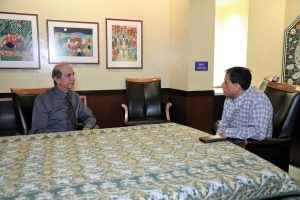Arab Americans in Dearborn are represented at every level of local governments – the city council, board of education, police station, county commission and various platforms of public service.
The Yemeni American News
 On the state and national levels, Arab representation from Michigan is also reaching new heights – a state representative, a US congresswoman, the Michigan solicitor general and a gubernatorial candidate who came close to winning his party’s nomination last year.
On the state and national levels, Arab representation from Michigan is also reaching new heights – a state representative, a US congresswoman, the Michigan solicitor general and a gubernatorial candidate who came close to winning his party’s nomination last year.
But it has not always been this way, less than 35 years ago, Mayor Mike Guido wanted to talk about the “Arab problem” in his campaign.
As Arab Americans became more involved in public discourse, Guido himself warmed up to the community after his election, highlighting the power of civic engagement.
If activists who pioneered the calls for political participation in the community are to thank for this momentous transformation, only a few people deserve the credit more than Joseph Borrajo.
Voter registration
The Arab-American Voter Registration and Education Committee, which he co-founded, was amongst the first organization to actively push Arab Americans to be a part of the democratic process and get their voices heard.
When he first started that work, it wasn’t easy. Politicians did not want to be associated with the community and even returned campaign contributions from Arab Americans.
But the work of the organization soon started to pay off.
“It became so strong in terms of its voice in the community and beyond to the national level that people took notice and we were no longer turned off, no longer were people hesitant to answer phone calls,” Borrajo told the Yemeni American News
“These politicians started calling us asking our community, “What can we do for you?”
Borrajo, whose father was from Yemen and mother was a Serbian immigrant from what is today Bosnia, said his parents taught him the values of hard work and dedication.
“My father came to this country as a teenager. He falsified his age to get gainful employment. He came from Yemen. He came from a village called Beit AlKabish midway between Sanaa and Ibb,” he said.
Upbringing
Borrajo grew up in an incredibly diverse Southend neighborhood in Dearborn – a mosaic of immigrants from dozens of country attracted by the opportunity of working for Ford Motor Company.
“The community I grew up in was extraordinary,” he said.
His mom and dad met on the assembly line at Ford.
“I have derived from my mother and father a strong sense of understanding of cultures on both sides,” Borrajo told YAN.
“It expanded my world in a very dramatic way in terms of understanding people from all walks of life not just the walk of life that I grew up in. I’ve got a few degrees and growing up in this richly diverse immigrant community I consider a more valuable education in many ways than the formal degrees that I got at different levels.”
Borrajo talked about lessons he learned from his father’s Muslim background and mother’s Orthodox Christian background.
“I learned the benevolence that he had with regard to his convictions as far as Islam. I’ve tried to conduct myself with the same model my dad taught me,” he said.
“My mother was a very devout mother. She took care of her children very well. She was a hard-working woman… I learned good values from my mother and father and number one was being very hard workers.”
Confronting ‘village mentality’
Borrajo hailed the progress of the community over the years.
“Our community was rich in a different way, we are mostly shop owners, and even then our goal was getting the community involved politically, we need to groom new young leadership,” he said.
“We looked to the little ones. The difference now is I look at these little ones, they’re grown; they’re professionals in every kind of profession you can think of and it makes my heart swell because these are the things we talked about 30 years ago.”
Despite his Yemeni heritage, Borrajo said sometimes he gets mistaken for being Lebanese or Iraqi. And even with activism within the Arab community, people tried to push him away once they knew he was Yemeni American.
“At the time the Yemeni community was the low on the totem pole,” he said. “There’s this mindset that’s prevalent to control those groups, I never liked it then, don’t like it now.
“I tried to overcome that mindset which I call a ‘village mentality’ supplanting the whole idea of having a bigger view, a bigger perspective of the Arab world in general. I’ve always been pan-Arabic in my perspective. I don’t like the differences that people create.”












